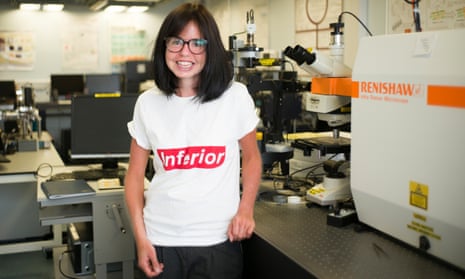Two scientists have launched a campaign to get a copy of a book that debunks accepted scientific “facts” about women into every state school in the UK.
The physicist Jess Wade, best known as “chief troublemaker at Imperial College London”, and Claire Murray, a chemist and beamline scientist at a UKsynchrotron, are raising funds to buy copies of Inferior: How Science Got Women Wrong and the New Science That’s Rewriting the Story by Angela Saini. The actor Daniel Radcliffe has described it as one of his favourite books.
The pair are hoping to raise £15,000 via a crowdfunding campaign in an effort to encourage more girls and young women to educate themselves about the structural barriers they face and how to overcome them.
“Reading Inferior changed our lives, and completely changed the way we thought about diversity,” Wade said. “There are a huge number of campaigns to get girls into science, but while a lot of money is being spent, there is no evidence that they work.

“But Inferior is a breath of fresh air; instead of saying we are so hard done by because we are women, it is written by an engineer who is examining where this bias comes from, and how it’s invaded our social consciousness.”
While money was being poured into attracting women into science, there was less work being done on retaining them, she said: “Actually improving the numbers takes good teachers, careers guidance that tells you what to study and what you can expect to earn [and] structured work experience, not just seeing naff video.”
The pair point out that young women make up only a fifth of physics A-level students, a quarter of undergraduate students and a tenth of physics professors. “This isn’t because of ability – girls outperform boys at GCSE and A-level - or enthusiasm, but because we exist in a world that tells children that girls and boys are good at different things. We meet too many girls who, despite being brilliant, are not confident, and are unsure of their own potential to become scientists,” they write on the crowdfunding page.
“How could their contributions to our understanding of the world be measured equally? Inferior has provided us with evidence for our debates about women’s capability, fuel for our advocacy and inspiration for our efforts to improve the celebration of women’s contributions to science.”
Inferior examines the causes of stereotypes, noting that it wasn’t until 1948 that women could graduate from Cambridge University (men could graduate in 1209) and 1946 that they could become fellows of the Royal Society (men were made fellows from 1600). Saini cites examples of the prejudice of some of the most celebrated minds in history, such as Charles Darwin, who claimed women would always be less intelligent than men.
“The chief distinction in the intellectual powers of the two sexes is [shown] by man attaining to a higher eminence, in whatever he takes up, than woman can attain – whether requiring deep thought, reason or imagination, or merely the use of the senses and hands,” Darwin wrote in The Descent of Man, published in 1871. “Thus man has ultimately become superior to woman.”
Saini also tells the less well-known story of Caroline Kennard, a member of the women’s movement in Boston, who replied in 1881: “Let the ‘environment’ of women be similar to that of men and with his opportunities, before she be fairly judged, intellectually his inferior, please.”
The author has promised to sign every book the campaign purchases, and the publisher, 4th Estate, has agreed to match the amount raised and organise distribution.
“We want people to realise where these stupid stereotypes come from and tackle them every day,” said Wade.









